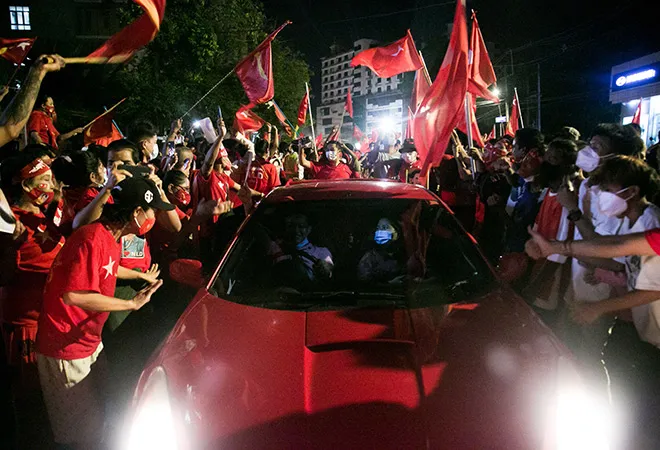-
CENTRES
Progammes & Centres
Location

The last few weeks have been festive despite much controversy over the outcome of the elections held on 8 November. Predictably, the National League for development (NLD) party is set to rule the country for a second term -- next five years. The party secured 396 of the total 642 parliamentary seats, compared to 390 it won the last term. Myanmar’s Union Parliament consists of the 440-seat Pyithu Hluttaw (House of Representatives) and 224-seat Amyotha Hluttaw (House of Nationalities). NLD has secured 60 per cent of the majority in both the houses despite 25 per cent seats being reserved for the military.
Though the celebrations are in full swing, the party needs to work on its stint with democracy. After the landslide victory in the first term, it was thought that the party’s prominent face, Aung San Suu Kyi would move in the areas she could with a parliamentary majority: things like repealing repressive laws, releasing political prisoners, creating a free press, trying to improve the economy.
Another issue which many spectators believed to be addressed and handled sensitively is the Rohingya issue. But contrary to the hopes of many such issues have remained unaddressed and have even brought the nation in negative lights in front of the international arena.
Thus, the second term of the party in office provides the government with a second opportunity to exercise and implement democratic transition which the first term could hardly witness. Despite many shortcomings of the party in the first term, it may be of importance to analyse the eagerness of the masses to vote NLD again back to power.
The domestic imagery of the state counsellor has been viewed by several spectators as being instrumental for yet another victory of the party. She has a special corner in the hearts of the masses. She is seen as the sacrificing and persecuted daughter of a famous leader who has the courage to stand up against the autocratic military government under which the people were forced to live for around five decades. Her image as the mother of the nation holds a very strong core among the masses.
While her silence and aloofness over the displaced Rohingyas has tarnished her image overseas, but back home she’s much loved and adored and continues to hold the reins. The stripping off accolades provided to her has been taken as personal insult by the citizens.
While her silence and aloofness over the displaced Rohingyas has tarnished her image overseas, but back home she’s much loved and adored and continues to hold the reins.
Moreover, her personal defence of her nation against the allegation of genocide at the International Court of Justice in The Hague last year has helped to enhance her aura in her home nation. During the entire pandemic, her calmness and her daily appearance on social media have struck a major chord with the general population. The economic policies and stimulus packages have been appreciated despite much incompetency shown by the party members. Thus, the imagery holds significance within the domestic politics of the nation and is instrumental for the path breaking victory.
If we keep the ethnic parties aside the Union Solidarity and Development Party (USDP) has been one of the strongest contenders for winning this election. However, the further deterioration of the support from the masses has been owing to its rigid outlook and an allergy to change its methods. Without a doubt, the party has failed to resuscitate itself as a plausible choice to the NLD despite its many attempts to do so in the last year.
The preventive and curative measures of COVID-19 were a good opportunity for the members of the party to enhance its position and uplift its image within the people. However, its age-old techniques of coercion and controversial tracking mechanisms, and humiliating experiences people underwent did not go down well with the populace. Also, the ongoing fight with the Arakan Army has been viewed by many as taking precedence over the management of the virus.
In addition, while the NLD was in power, the party did not put forward any novel policy to show how it will do things another way if it comes to power. The stalled effort towards the amendment of the constitution additionally is one major disappointment.
It is interesting to note that despite the majority parties’ show less interest towards the ethnic minorities, for instance, the displaced Rohingyas who are considered stateless and thus denied basic rights for sustenance; it seems that the general population is unsympathetic and unconcerned towards the injustice done to them. Currently 126,000 are somehow surviving in the open detention centres where only 16 percent of Rohingya in the camps reported receiving necessary medical care. There is rampant food insecurity and inadequate WASH services.
The displaced population within the camps is not even provided with adequate masks and under testing of COVID cases is quite well known. The National League for Democracy government and the military have at various times denied the scale, scope and legitimacy of the suffering and the urgency or necessity of taking responsibility.
Unfortunately, despite the ethnic and human rights groups raising questions regarding inadequate services provided to these people, the general masses have never questioned the leaders of the nation regarding this injustice. It may propel one to comment that the populace themselves hold the displaced people as outsiders and are unaffected by their fate.
Despite the ethnic and human rights groups raising questions regarding inadequate services provided to these people, the general masses have never questioned the leaders of the nation regarding this injustice.
This demonstrates support for a bigoted view that sanctions the exclusion of the Rohingya from the political community of Myanmar. Accordingly, the rights of the displaced Rohingyas become more redundant in the process. The current election features no names of the rohingya in the list of electorates. The current situation is raising human rights and ethnic leaders to demand election to be held at northern Rakhine states.
According to political analysts, the early results showed ethnic parties had won some seats in Kayah, Mon, and Shan states, where many people harbor grievances against the central government, but the overall picture was of another NLD landslide. Thus, it may be safe to suggest that the victory of the party with high popularity reflects the nature of democracy, which is majority oriented democracy where ethnic groups fall at the bottom of the list.
While, the ethnic issues and internal peace should be the focus of the new regime; the Rakhine State crisis has been isolated from both the peace process and debates about constitutional reform. In a move to partially address this issue, the NLD’s central executive committee (CEC) is set to meet soon to discuss forming a national unity government and then will hold talks with the ethnic parties.
Though this has not been a new move one can only hope the upshot will be fruitful and the voice of the ethnic minority leaders that are stronger in their constituencies will be heard and not drowned within the majority. However, the current trends of politics continue to exclude the Rohingya issue. The next five years will determine whether this inclination can be altered.
This essay originally appeared in South Asia Weekly
The views expressed above belong to the author(s). ORF research and analyses now available on Telegram! Click here to access our curated content — blogs, longforms and interviews.

Sreeparna Banerjee is an Associate Fellow in the Strategic Studies Programme. Her work focuses on the geopolitical and strategic affairs concerning two Southeast Asian countries, namely ...
Read More +